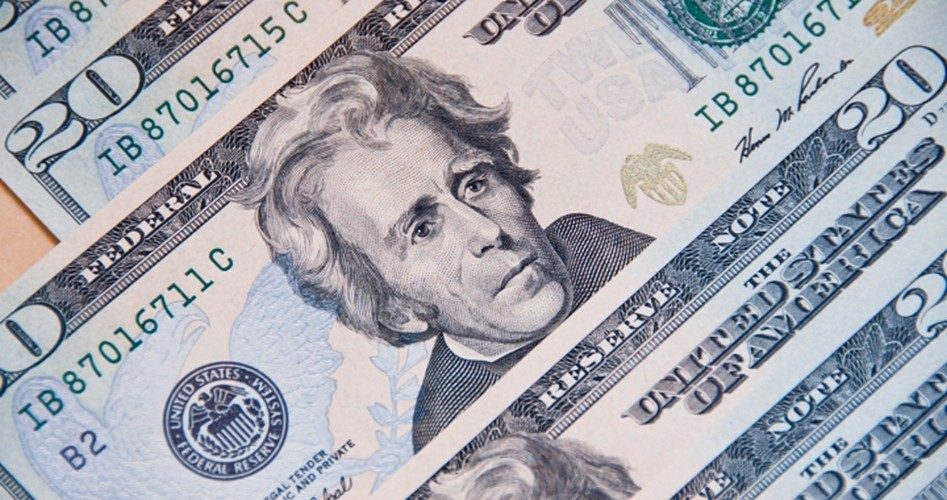
For those searching for the secret of President Donald Trump’s political appeal, one can cite an under-reported remark he made during his Tennessee campaign rally on Monday, in which he noted that he has kept Andrew Jackson (who was from the Volunteer State) on the $20 bill. “Andrew Jackson, who continues to be on the $20 bill, you know that. I’m a big Andrew Jackson fan.” Trump has even hung a portrait of “Old Hickory” in the White House.
During his campaign for president, Trump dismissed the move to take Jackson off the $20 bill as an example of “political correctness.” No doubt this is one reason why millions of Americans like Trump — they are fed up with the continued attacks upon American heroes such as Jackson; upon Founding Fathers such as Washington and Jefferson; the trashing of the National Anthem and its author, Francis Scott Key; and the list goes on. There has even been a move — so far unsuccessful — to diminish the heroism of Texas defender of the Alamo, William Barrett Travis.
And now they have a president who has dared to say “no” to the political correctness and Taliban-like movement afoot in the country. “I would love to leave Andrew Jackson [on the bill] and see if we could maybe come up with another denomination. Maybe we do the $2 bill or do another bill. I don’t like seeing it [the move to remove Jackson’s image]. Yes, I think it is pure political correctness. Been on the bill for many, many years,” Trump explained on the Today Show.
It was during the tenure of the previous president, Barack Obama, that the idea was floated that Jackson’s picture be scrubbed and replaced by Harriett Tubman, a black woman who helped many slaves escape with her Underground Railroad.
But when Trump took office, that idea was quickly nixed. Steve Mnuchin, secretary of the treasury for Trump, said in an interview last year with CNBC, “It’s not something that I’m focused on at the moment. The issues of why we change it will be primarily related to what we need to do for security purposes.”
Certainly, Tubman’s work helping African-Americans escape slavery is commendable. But is it more than what Jackson did to be honored on American currency?
On January 8, 1815, leading a rag-tag army composed of frontier militia, pirates, and allied Indians, Jackson defeated the British army at the Battle of New Orleans — an army that had just defeated Napoleon at the Battle of the Nations in Europe. This huge and important win made Jackson almost universally known and admired in the United States, and eventually propelled him into the White House as our seventh president.
Had Jackson lost the Battle of New Orleans, that city would likely not be part of the United States today. Historical illiterates often comment that the battle was actually fought after the War of 1812 was over. Their contention is that the Treaty of Ghent, ending the war, was signed in Belgium several days earlier. Such an assertion does not consider that the Treaty was not yet ratified by the British Parliament (nor the U.S. Congress), and therefore not yet in effect. Had the British won at New Orleans, it is doubtful the Parliament would have ratified the treaty and simply handed New Orleans over to the United States.
Not as well known, but nevertheless very important, was Jackson’s war against the Second Bank of the United States. In 1832, in an effort to defeat Jackson in a reelection bid for president, the president of the Second Bank of the United States, Nicholas Biddle, brought up the bank’s 20-year charter for congressional renewal four years early. The opposition Whigs believed that should Jackson veto the renewal of the bank’s charter, he would lose the election to pro-Bank Henry Clay. If he signed it, then their central bank was safe for another 20 years. What they thought would be a win-win situation turned out to be instead a lose-lose situation, as Jackson not only vetoed the renewal, he was easily reelected.
In his veto message, Jackson expressed his belief that the bank was an example of the wealthy and powerful elites using the power of the federal government to achieve an unfair advantage — much like “crony capitalism” today — and was a dangerous concentration of power in the hands of that powerful elite. He believed the Bank was unconstitutional, as the Constitution had given no power to Congress to charter a bank monopoly.
One hundred years after Jackson’s election, the U.S. Treasury placed Jackson’s portrait on the $20 Federal Reserve Note. The Federal Reserve System had been established by Congress in 1913, and was, in effect, America’s third central bank. The Insiders who pushed through the Federal Reserve banking monopoly had learned from the mistakes of the elites who had created the Second Bank of the United States. No time limit of 20 years was placed upon its life, so it goes on in perpetuity.
Some have even wondered if putting Jackson’s image on any Federal Reserve Note was a little “inside joke” against the man mainly responsible for killing off central banking in America earlier in our history.
Perhaps a compromise is in order. Take Jackson off the $20 Federal Reserve Note, and abolish the Federal Reserve System itself. That is a compromise that “Old Hickory” himself would certainly approve of!
Image: Buba1955 via iStock / Getty Images Plus
Steve Byas teaches history and government at Randall University. His book, History’s Greatest Libels, challenges some of the unfair attacks upon heroes such as George Washington, Christopher Columbus, and Joseph McCarthy.



